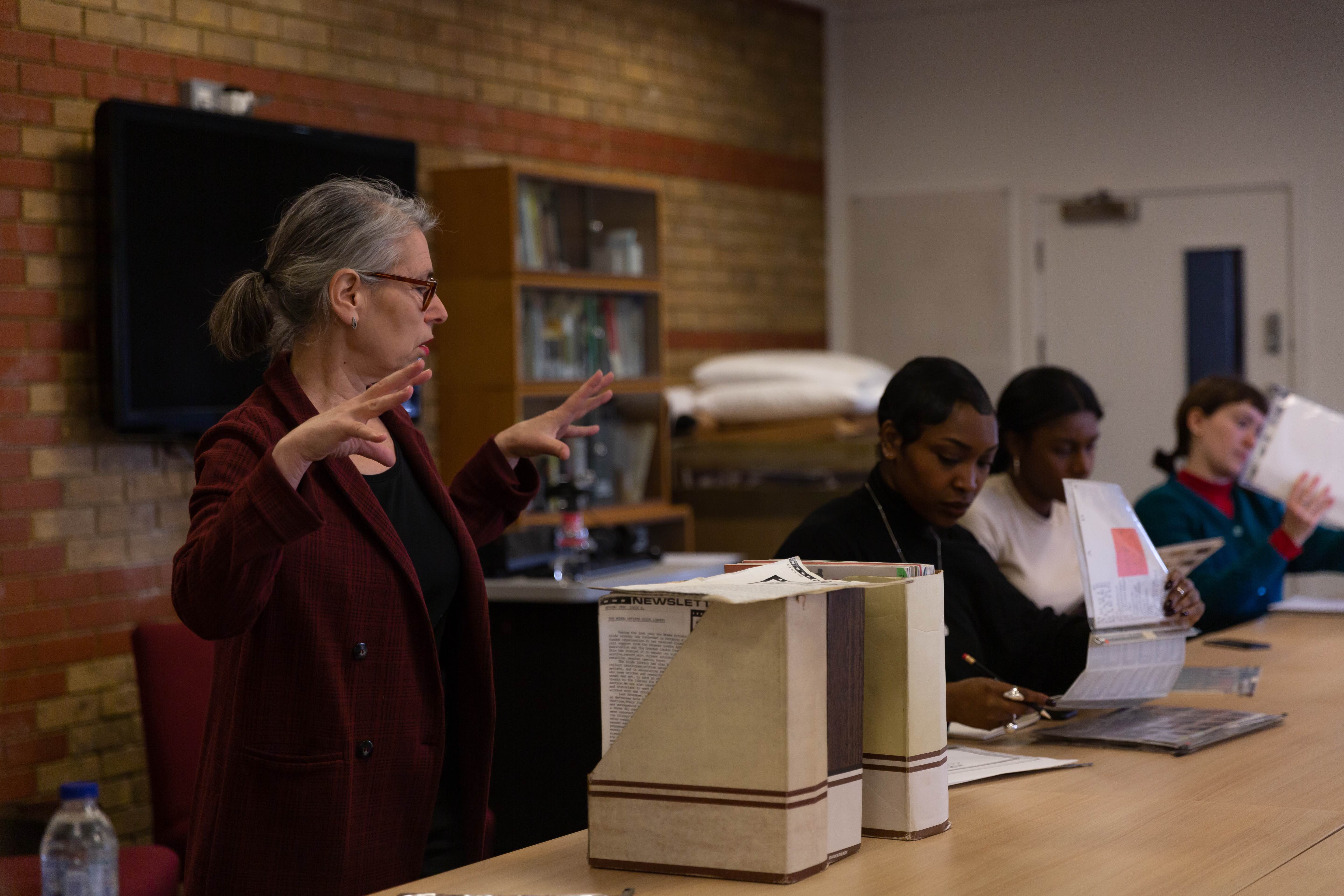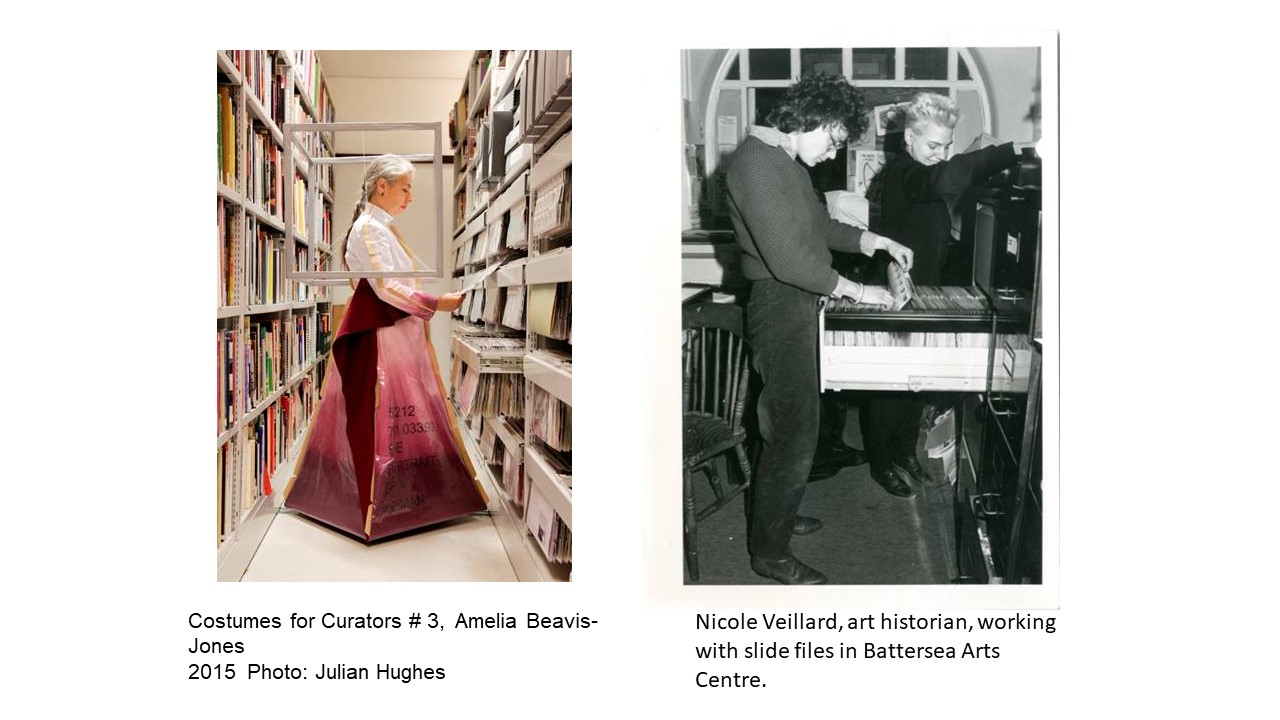Join us for our next Open Library event on 26th November to learn how contemporary women’s art library projects are sharing the work of women artists through collecting documentation and artworks.
Open Library at MIMA, Middlesbrough 10 – 4pm
Talk at 2pm
The Women’s Art Library (WAL) began as the Women Artists Slide Library, an artists’ initiative that developed into an arts organisation publishing catalogues and books as well as a magazine from early 1983 to 2002. Today the WAL is housed in Goldsmith’s Special Collections and continues to collect documentation such as slides, artist statements, exhibition ephemera, catalogues, and press material in addition to audio and videotapes, photographs and digital media.
The desire to collect and share the work of contemporary women artists was just one of the motivations of artists starting the Women Artists Slide Library. Today we can look at the Women’s Art Library as demonstrating an artist-led approach to research and methods of distribution that address the lack of representation and support for historic and contemporary artistic practices of women. It has become a recognisable and inspirational model for contemporary artist-led projects such as: The West Asian and North African Women’s Art Library* and the Women Artist of the North East Library. Both projects aim to represent women’s practices but are also specifically concerned with geographical representation, marginalised heritages, and the patriarchal and colonial traits of traditional archival practice. What and how can they learn from the WAL model and what might they want to differently to collecting and share the artists they care about.
Join us for a discussion exploring some of the questions and challenges of this work will be Curator, Althea Greenan from Women’s Art Library Collection and Holly Argent from the Women Artists of the North East Library and Chair, Helen Welford, Assistant Curator at MIMA.
*Look out for a future event with Evar Hussayni and Nicole Nalbandian (The West Asian and North African Women’s Art Library) in 2022!!

Women’s Art Library
The Women’s Art Library (WAL) began as the Women Artists Slide Library, an artists’ initiative that developed into an arts organization publishing catalogues and books as well as a magazine from early 1983 to 2002. Today the WAL is housed in Goldsmith’s Special Collections and continues to collect documentation such as slides, artist statements, exhibition ephemera, catalogues, and press material in addition to audio and videotapes, photographs and digital media.
Dr Althea Greenan
Dr Althea Greenan is Curator of Special Collections and Archives at Goldsmiths University of London working extensively with the Women’s Art Library (WAL) collection. She facilitates new projects and original research with artists, students and academics exploring the WAL and positioning the collection in contemporary practices. Greenan has written on the work of women artists since the 1980s and her doctoral research on the WAL’s collection of 35mm slides features in the anthology Of Other Spaces (edited by Sophia Hao, Sternberg Press 2019), in a special issue of the journal Women: a cultural review (edited by Dr Victoria Horne, Taylor and Francis 2019) and in the exhibition Dark Energy: feminist organizing, working collectively (xhibit, Academy of Fine Arts Vienna March 2019). She has written on the Women’s Art Library for Feminism and Museums, volume 1 (edited by Dr Jenna C Ashton, MuseumsETC 2017) and elsewhere including the magazine Orlando 02 (edited by Philomena Epps 2017). She has recently contributed to Salon For A Speculative Future (edited by Monika Oechsler, with Sharon Kivland 2019) and Anonymous Was A Woman (edited by Jenna C. Ashton 2020). Her article looking at the politics of experimental photo-chemical filmwork “The Trajectory of Miriam Sampaio” appeared in The Moving Image Review and Art Journal (MIRAJ) Volume 9, Number 1, 1 April 2020, pp. 64-74(11) and her reflections on the archive work of Rita Keegan will appear in Mirror Reflecting Darkly: The Rita Keegan Archive (Goldsmiths Press/MIT Press edited by Rita Keegan, Matthew Harle, and Ego Ahaiwe Sowinski 2021).

